One of the most effective ways of picking up a new language is through music and song. Not only does music make language learning more enjoyable, but it is also repetitive, allowing unfamiliar vocabulary and grammar patterns to sink in more quickly than if you heard them only a few times in conversation.
Children, in particular, can boost their language abilities by listening to lots of songs in the target language, even if they don’t live in the country where the language is spoken.
In this article, we’ve compiled a list of what we feel are some of the best Italian songs for kids. All of them are available to listen to for free on YouTube. By playing these fun tunes to your little ones on a regular basis, you can be sure that they will start singing in Italian in no time at all!
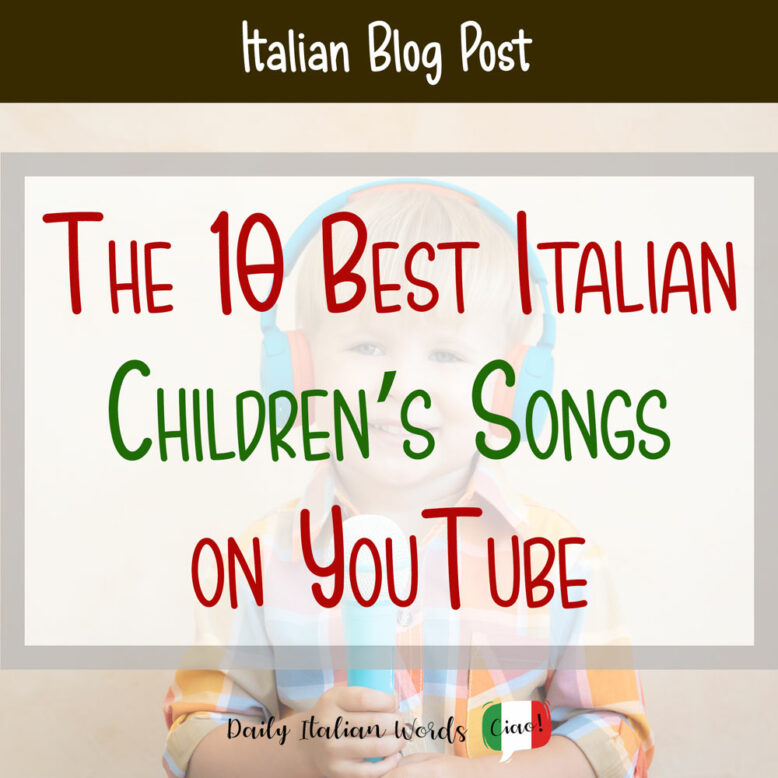
1. Palloncino Blu

Palloncino Blu (Blue Balloon) is one of those lovely little tunes that gets stuck in your head as soon as you hear it. It tells the story of a blue balloon that, by travelling into the sky and under the sea, meets a number of interesting friends. The repetitive chorus makes it very easy for children to learn quickly.
Palloncino blu su, su, su,
Nel cielo se ne va su, su, su,
E canticchiando fa
Lallero lero là
Incontra una farfalla
Le dice buona sera
Incontra una cornacchia
Mamma com’è nera
Incontra un passerotto
Che non sa volare
Attaccati al suo filo
Se da mamma vuoi tornare
Palloncino blu giù, giù, giù
Nel mare se ne va giù, giù, giù
E canticchiando fa
Lallero lero là
Incontra un pesciolino
Gli dice buona sera
Incontra una balena
Mamma com’è nera
Incontra un polipetto che non sa nuotare
Attaccati al suo filo se da mamma vuoi tornare
Blue balloon up, up, up
Into the sky it goes, up, up, up
And it hums
Lallero lero là
It meets a butterfly
And says good evening to her
It meets a crow
Mommy, it’s so black
It meets a swallow
That doesn’t know how to fly
Hold on to its string
If you want to return to mom
Blue balloon, down, down, down
Into the sea it goes, down, down, down
And it hums
Lallero lero là
It meets a little fish
And says good evening to him
It meets a whale
Mummy, it’s so black!
It meets an octopus that doesn’t know how to swim
Hold on to its string
If you want to return to mom
2. Volevo un Gatto Nero
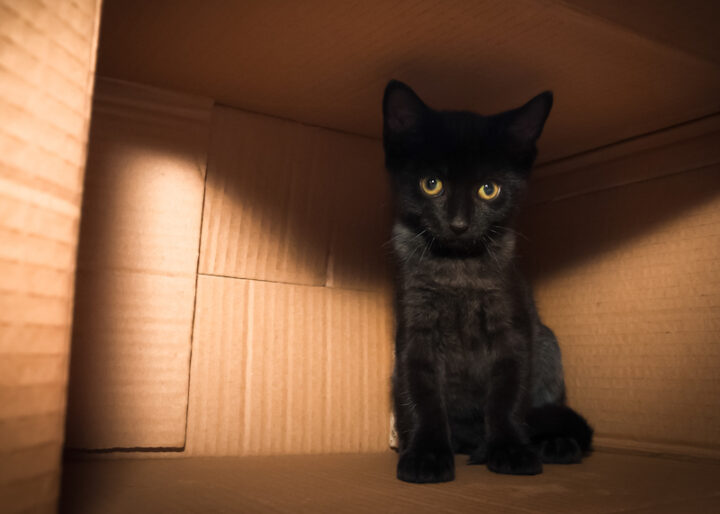
As a cat lover, I may be a little biased but Volevo un Gatto Nero (I Wanted a Black Cat) is definitely one of my favourite Italian children’s songs on this list. It tells the story of a child who offers to give his friend a number of different animals in exchange for a black cat, but ends up receiving a white cat instead.
Un coccodrillo vero
Un vero alligatore
Ti ho detto che l’avevo
E l’avrei dato a te
Ma i patti erano chiari
Un coccodrillo a te
E tu dovevi dare
Un gatto nero a me
Volevo un gatto nero, nero, nero
Mi hai dato un gatto bianco
Ed io non ci sto più
Volevo un gatto nero, nero, nero
Siccome sei un bugiardo
Con te non gioco più
Non era una giraffa
Di plastica o di stoffa
Ma una in carne ed ossa
E l’avrei data a te
Ma i patti erano chiari
Una giraffa a te
E tu dovevi dare
Un gatto nero a me
Volevo un gatto nero, nero, nero
Mi hai dato un gatto bianco
Ed io non ci sto più
Volevo un gatto nero, nero, nero
Siccome sei un bugiardo
Con te non gioco più
Un elefante indiano
Con tutto il baldacchino
L’avevo nel giardino
E l’avrei dato a te
Ma i patti erano chiari
Un elefante a te
E tu dovevi dare
Un gatto nero a me
Volevo un gatto nero, nero, nero
Mi hai dato un gatto bianco
Ed io non ci sto più
Volevo un gatto nero, nero, nero
Siccome sei un bugiardo
Con te non gioco più
I patti erano chiari
L’intero zoo per te
E tu dovevi dare
Un gatto nero a me
Volevo un gatto nero, nero, nero
Invece è un gatto bianco
Quello che hai dato a me
Volevo un gatto nero
Ma insomma nero o bianco
Il gatto me lo tengo
E non do niente a te
A real crocodile
A real alligator
I told you I had one
And I would have given it to you
But the agreement was clear
A crocodile for you
And you were supposed to give
A black cat to me
I wanted a black, black, black cat
You gave me a white cat
And I won’t stand for it anymore
I wanted a black, black, black cat
Since you are a liar
I won’t play with you anymore
It was not a giraffe
Made of plastic or cloth
But one in flesh and blood
And I would have given it to you
But the agreement was clear
A giraffe for you
And you were supposed to give
A black cat to me
I wanted a black, black, black cat
You gave me a white cat
And I won’t stand for it anymore
I wanted a black, black, black cat
Since you are a liar
I won’t play with you anymore
An Indian elephant
With the canopy and everything
I kept it in the garden
And I would have given it to you
But the agreement was clear
An elephant for you
And you were supposed to give
A black cat to me
I wanted a black, black, black cat
You gave me a white cat
And I won’t stand for it anymore
I wanted a black, black, black cat
Since you are a liar
I won’t play with you anymore
The agreement was clear
The whole zoo for you
And you were supposed to give
A black cat to me
I wanted a black, black, black cat
Instead a white cat
Is what you gave to me
I wanted a black cat
But in short, black or white
I’m keeping the cat
And I won’t give anything to you
3. Il Coccodrillo Come Fa
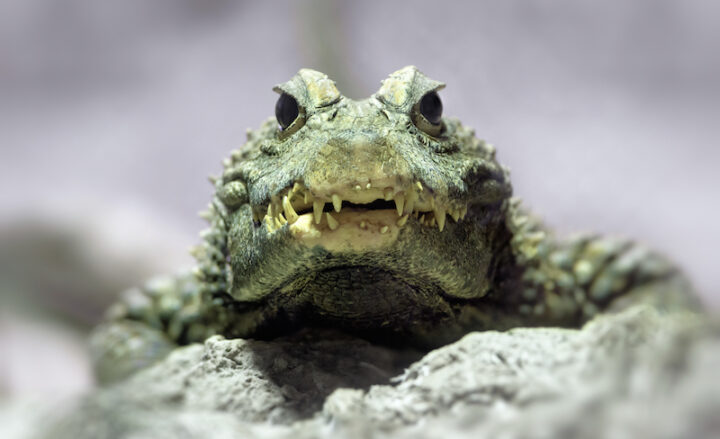
Another very catchy Italian tune is Il Coccodrillo Come Fa (What Does the Crocodile Say). Knowing that other animals such as cats and dogs make very distinct sounds, the child in the song goes on a mission to find out what sound crocodiles make!
Oggi tutti insieme cercheremo di imparare
Come fanno per parlare fra di loro gli animali
Come fa il cane? Bau! Bau!
E il gatto? Miao!
L’asinello? Hi! Hoo! Hi! Hoo!
La mucca? Muuu…!
La rana? Cra! Cra!
La pecora? Beee…!
E il coccodrillo?
E il coccodrillo? Boh…!
Il coccodrillo come fa
Non c’è nessuno che lo sa
Si dice mangi troppo
Non metta mai il cappotto
Che con i denti punga
Che molto spesso pianga
Però quand’è tranquillo come fa ‘sto coccodrillo?
Il coccodrillo come fa
Non c’è nessuno che lo sa
Si arrabbia ma non strilla
Sorseggia camomilla
E mezzo addormentato se ne va
Guardo sui giornali, non c’è scritto niente
Sembra che il problema non importi alla gente
Ma se per caso al mondo c’è qualcuno che lo sa
La mia domanda è ancora questa qua
Il coccodrillo come fa?
Non c’è nessuno che lo sa
Si dice mangi troppo
Non metta mai il cappotto
Che con i denti punga
Che molto spesso pianga
Però quand’è tranquillo come fa ‘sto coccodrillo?
Il coccodrillo come fa
Non c’è nessuno che lo sa
Si arrabbia ma non strilla
Sorseggia camomilla
E mezzo addormentato se ne va
Adesso ripetiamo se vogliamo ricordare
Come fanno per parlare tra di loro gli animali
Come fa il cane? Bau! Bau!
E il gatto? Miao!
L’asinello? Hi! Hoo! Hi! Hoo!
La mucca? Muuu…!
La rana? Cra! Cra!
La pecora? Beee…!
E il coccodrillo?
E il coccodrillo? Boh…!
Il coccodrillo come fa
Non c’è nessuno che lo sa
Si dice mangi troppo
Non metta mai il cappotto
Che con i denti punga
Che molto spesso pianga
Però quand’è tranquillo come fa ‘sto coccodrillo?
Il coccodrillo come fa
Non c’è nessuno che lo sa
Si arrabbia ma non strilla
Sorseggia camomilla
E mezzo addormentato se ne va
Today let’s all try to learn together
How animals talk to each other
What does the dog say? Woof woof!
And the cat? Meow!
The donkey? Heehaw!
The cow? Moo!
The frog! Ribbit! Ribbit!
The sheep? Baaah!
And the crocodile?
And the crocodile? Who knows!
What does the crocodile say
Nobody knows
It is said he eats too much
That he never puts on his coat
That he pricks with his teeth
And cries often
But when he’s relaxed what does the crocodile say?
What does the crocodile say
Nobody knows
He gets angry but doesn’t scream
He sips chamomile tea
And half-asleep he goes on his merry way
I look at the newspapers, nothing is written
It seems that the people don’t care about the problem
But if by chance there is someone in the world who knows
This is still my question
What does the crocodile say
Nobody knows
It is said he eats too much
That he never puts on his coat
That he pricks with his teeth
And cries often
But when he’s relaxed what does the crocodile say?
What does the crocodile say
Nobody knows
He gets angry but doesn’t scream
He sips chamomile tea
And half-asleep he goes on his merry way
Now let’s repeat if we want to remember
How animals talk to each other
What does the dog say? Woof woof!
And the cat? Meow!
The donkey? Heehaw!
The cow? Moo!
The frog! Ribbit! Ribbit!
The sheep? Baaah!
And the crocodile?
And the crocodile? Who knows!
What does the crocodile say
Nobody knows
It is said he eats too much
That he never puts on his coat
That he pricks with his teeth
And cries often
But when he’s relaxed what does the crocodile say?
What does the crocodile say
Nobody knows
He gets angry but doesn’t scream
He sips chamomile tea
And half-asleep he goes on his merry way
4. Alla Fiera Dell’Est
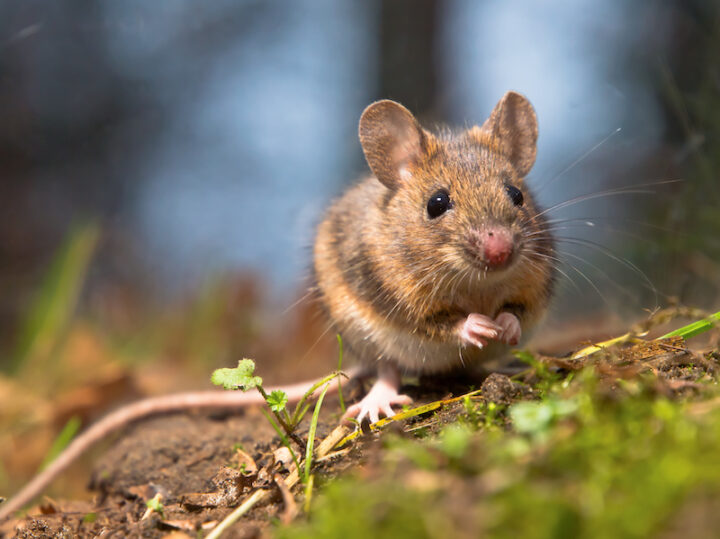
Alla Fiera Dell’Est (At the Eastern Fair), which was released in the 1970s by singer Angelo Branduardi, is a popular folk song amongst Italian children and adults thanks to its catchy melody and repetitive fable-like verses. It is a cumulative song that recounts a growing string of events that start with the seemingly insignificant act of buying a mouse at the market.
Alla fiera dell’est, per due soldi, un topolino mio padre comprò
Alla fiera dell’est, per due soldi, un topolino mio padre comprò
E venne il gatto, che si mangiò il topo, che al mercato mio padre comprò
Alla fiera dell’est, per due soldi, un topolino mio padre comprò
E venne il cane, che morse il gatto, che si mangiò il topo
Che al mercato mio padre comprò.
Alla fiera dell’est, per due soldi, un topolino mio padre comprò
E venne il bastone, che picchiò il cane, che morse il gatto,
Che si mangiò il topo che al mercato mio padre comprò.
Alla fiera dell’est, per due soldi, un topolino mio padre comprò
E venne il fuoco, che bruciò il bastone, che picchiò il cane,
Che morse il gatto, che si mangiò il topo che al mercato mio padre comprò.
Alla fiera dell’est, per due soldi, un topolino mio padre comprò
E venne l’acqua che spense il fuoco che bruciò il bastone che picchiò il cane
Che morse il gatto, che si mangiò il topo che al mercato mio padre comprò.
Alla fiera dell’est, per due soldi, un topolino mio padre comprò
E venne il toro, che bevve l’acqua, che spense il fuoco,
Che bruciò il bastone, che picchiò il cane,
Che morse il gatto, che si mangiò il topo che al mercato mio padre comprò.
Alla fiera dell’est, per due soldi, un topolino mio padre comprò
E venne il macellaio, che uccise il toro, che bevve l’acqua,
Che spense il fuoco, che bruciò il bastone, che picchiò il cane,
Che morse il gatto, che si mangiò il topo che al mercato mio padre comprò.
Alla fiera dell’est, per due soldi, un topolino mio padre comprò
E l’angelo della morte, sul macellaio, che uccise il toro, che bevve l’acqua,
Che spense il fuoco, che bruciò il bastone, che picchiò il cane,
Che morse il gatto, che si mangiò il topo che al mercato mio padre comprò.
Alla fiera dell’est, per due soldi, un topolino mio padre comprò
E infine il Signore, sull’angelo della morte, sul macellaio,
Che uccise il toro, che bevve l’acqua, che spense il fuoco,
Che bruciò il bastone, che picchiò il cane, che morse il gatto,
Che si mangiò il topo che al mercato mio padre comprò.
Alla fiera dell’est, per due soldi, un topolino mio padre comprò
At the eastern fair, for two pennies, my father bought a little mouse
At the eastern fair, for two pennies, my father bought a little mouse
The cat came, and ate the mouse which my father bought at the market
At the eastern fair, for two pennies, my father bought a little mouse
The dog came, and bit the cat, that ate the mouse which my father bought at the market.
At the eastern fair, for two pennies, my father bought a little mouse
The stick came, and hit the dog, that bit the cat, that ate the mouse which my father bought at the market.
At the eastern fair, for two pennies, my father bought a little mouse
The fire came, and burned the stick, that hit the dog, that bit the cat, that ate the mouse which my father bought at the market.
At the eastern fair, for two pennies, my father bought a little mouse
The water came, and put out the fire that burned the stick, that hit the dog, that bit the cat, that ate the mouse which my father bought at the market.
At the eastern fair, for two pennies, my father bought a little mouse
The bull came, and drank the water, that put out the fire, that burned the stick, that hit the dog, that bit the cat, that ate the mouse which my father bought at the market.
At the eastern fair, for two pennies, my father bought a little mouse
The butcher came, and killed the bull that drank the water, that put out the fire, that burned the stick, that hit the dog, that bit the cat, that ate the mouse which my father bought at the market.
At the eastern fair, for two pennies, my father bought a little mouse
The angel of death came for the butcher, who killed the bull, that drank the water, that put out the fire, that burned the stick, that hit the dog, that ate the mouse which my father bought at the market.
At the eastern fair, for two pennies, my father bought a little mouse
And finally God came for the angel of death, who came for the butcher, who killed the bull, that drank the water, that put out the fire, that burned the stick, that hit the dog, that bit the cat, that ate the mouse which my father bought at the market.
At the eastern fair, for two pennies, my father bought a little mouse
5. I Due Liocorni
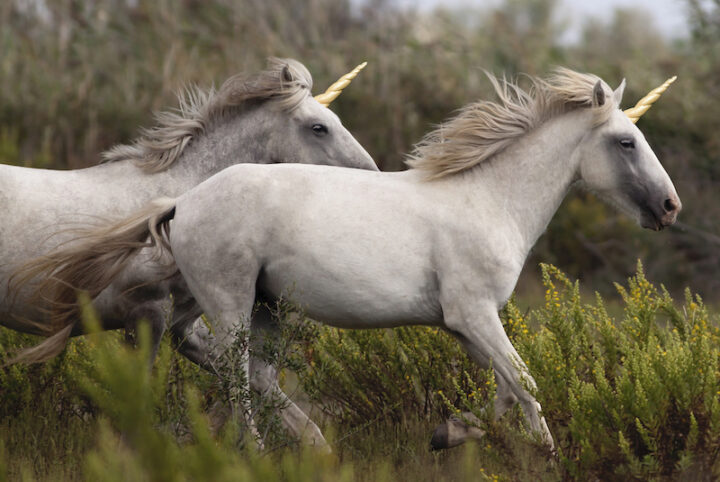
Could it be possible that Noah forgot all about the unicorns when he built his famous ark for the world’s living creatures? Well, that’s exactly what this cute children’s song suggests!
Ci son due coccodrilli
Ed un orangotango,
Due piccoli serpenti
E un’aquila reale,
Il gatto, il topo, l’elefante:
Non manca più nessuno;
Solo non si vedono i due leocorni.
Un dì Noè nella foresta andò
E tutti gli animali volle intorno a sè:
“Il Signore si è arrabbiato il diluvio manderà:
Voi non ne avete colpa, io vi salverò.”
Ci son due coccodrilli
Ed un orangotango,
Due piccoli serpenti
E un’aquila reale,
Il gatto, il topo, l’elefante:
Non manca più nessuno;
Solo non si vedono i due leocorni.
E mentre salivano gli animali
Noè vide nel cielo un grosso nuvolone
E goccia dopo goccia a piover cominciò:
“Non posso più aspettare l’arca chiuderò.”
Ci son due coccodrilli
Ed un orangotango,
Due piccoli serpenti
E un’aquila reale,
Il gatto, il topo, l’elefante:
Non manca più nessuno;
Solo non si vedono i due leocorni.
E mentre continuava a salire il mare
E l’arca era lontana con tutti gli animali
Noé non pensò più a chi dimenticò:
Da allora più nessuno vide i due liocorni.
Ci son due coccodrilli
Ed un orangotango,
Due piccoli serpenti
E un’aquila reale,
Il gatto, il topo, l’elefante:
Non manca più nessuno;
Solo non si vedono i due leocorni.
There are two crocodiles
And an orangutan,
Two small snakes
And a golden eagle,
The cat, the mouse, the elephant:
No one is missing;
It’s just that the two unicorns are nowhere to be seen.
One day Noah went to the forest
And he wanted all the animals around him
“The Lord is angry, he will send a flood:
You are not to blame, I will save you.”
There are two crocodiles
And an orangutan,
Two small snakes
And a golden eagle,
The cat, the mouse, the elephant:
No one is missing;
It’s just that the two unicorns are nowhere to be seen.
And while the animals climbed on board
Noah saw a large cloud in the sky
And drop by drop it started raining:
“I can no longer wait. I’m closing the ark.”
There are two crocodiles
And an orangutan,
Two small snakes
And a golden eagle,
The cat, the mouse, the elephant:
No one is missing;
It’s just that the two unicorns are nowhere to be seen.
And as the sea continued to rise
And the ark was far away with all the animals
Noah never stopped to think about who he forgot:
Since then, no one has seen the two unicorns.
There are two crocodiles
And an orangutan,
Two small snakes
And a golden eagle,
The cat, the mouse, the elephant:
No one is missing;
It’s just that the two unicorns are nowhere to be seen.
6. Ci Vuole un Fiore
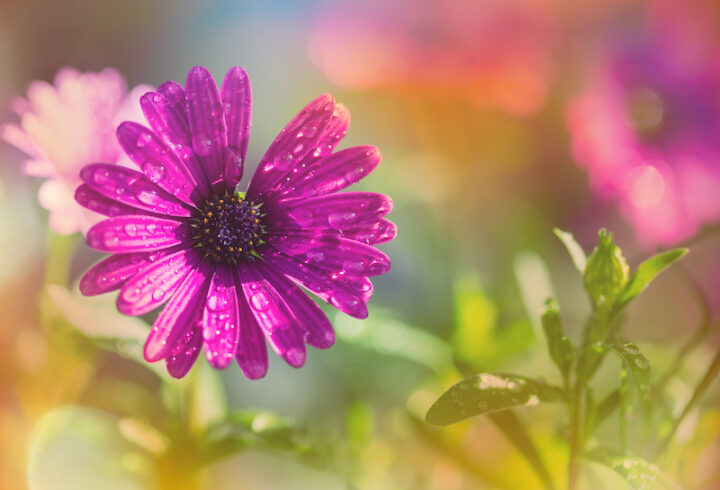
Repetition is an excellent way for children and adult learners of any language to pick up new vocabulary and grammar. In the case of this cute little song about a flower, the patterns per fare… (to make…) and ci vuole (you need… / …is needed) are repeated numerous times with different words. This is what makes it one of the best Italian songs for kids of all ages!
Le cose di ogni giorno raccontano segreti
A chi le sa guardare ed ascoltare
Per fare un tavolo ci vuole il legno
Per fare il legno ci vuole l’albero
Per fare l’albero ci vuole il seme
Per fare il seme ci vuole il frutto
Per fare il frutto ci vuole il fiore
Ci vuole un fiore, ci vuole un fiore
Per fare un tavolo ci vuole un fiore
Per fare un fiore ci vuole un ramo
Per fare il ramo ci vuole l’albero
Per fare l’albero ci vuole il bosco
Per fare il bosco ci vuole il monte
Per fare il monte ci vuol la terra
Per far la terra ci vuole un fiore
Per fare tutto ci vuole un fiore
Per fare un tavolo ci vuole il legno
Per fare il legno ci vuole l’albero
Per fare l’albero ci vuole il seme
Per fare il seme ci vuole il frutto
Per fare il frutto ci vuole il fiore
Ci vuole un fiore, ci vuole un fiore
Per fare tutto ci vuole un fiore
The everyday things
Tell secrets
To those who know how to look and listen
To make a table you need wood
To make wood you need a tree
To make a tree you need a seed
To make a seed you need a fruit
To make a fruit you need a flower
You need a flower, you need a flower
To make a table you need a flower
To make a flower you need a branch
To make a branch you need a tree
To make a tree you need a forest
To make a forest you need a mountain
To make a mountain you need the earth
To make the earth you need a flower
To make everything you need a flower
To make a table you need wood
To make wood you need a tree
To make a tree you need a seed
To make a seed you need a fruit
To make a fruit you need a flower
You need a flower, you need a flower
To make everything you need a flower
7. Se Sei Felice Tu Lo Sai Batti Le Mani

Here we have the Italian version of the famous song If You’re Happy and You Know it (Clap Your Hands). A few actions have been substituted but overall, the song is almost identical to the original!
Se sei felice e tu lo sai batti le mani
Se sei felice e tu lo sai batti le mani
Se sei felice e tu lo sai e mostrarmelo potrai
Se sei felice e tu lo sai batti le mani
Se sei felice e tu lo sai batti i piedi
Se sei felice e tu lo sai batti i piedi
Se sei felice e tu lo sai e mostrarmelo potrai
Se sei felice e tu lo sai batti i piedi
Se sei felice e tu lo sai schiocca la lingua
Se sei felice e tu lo sai schiocca la lingua
Se sei felice e tu lo sai e mostrarmelo potrai
Se sei felice e tu lo sai schiocca la lingua
Se sei felice e tu lo sai schiocca le dita
Se sei felice e tu lo sai schiocca le dita
Se sei felice e tu lo sai e mostrarmelo potrai
Se sei felice e tu lo sai schiocca le dita
Se sei felice e tu lo sai fai lo starnuto
Se sei felice e tu lo sai fai lo starnuto
Se sei felice e tu lo sai e mostrarmelo potrai
Se sei felice e tu lo sai fai lo starnuto
Se sei felice e tu lo sai fammi un saluto (ciao)
Se sei felice e tu lo sai fammi un saluto (ciao)
Se sei felice e tu lo sai e mostrarmelo potrai
Se sei felice e tu lo sai fammi un saluto (ciao)
Se sei felice e tu lo sai mandami un bacio
Se sei felice e tu lo sai mandami un bacio
Se sei felice e tu lo sai e mostrarmelo potrai
Se sei felice e tu lo sai mandami un bacio
If you’re happy and you know it clap your hands
If you’re happy and you know it clap your hands
If you’re happy and you know it you can show me
If you’re happy and you know it clap your hands
If you’re happy and you know it stomp your feet
If you’re happy and you know it stomp your feet
If you’re happy and you know it you can show me
If you’re happy and you know it stomp your feet
If you’re happy and you know it click your tongue
If you’re happy and you know it click your tongue
If you’re happy and you know it you can show me
If you’re happy and you know it click your tongue
If you’re happy and you know it snap your fingers
If you’re happy and you know it snap your fingers
If you’re happy and you know it you can show me
If you’re happy and you know it snap your fingers
If you’re happy and you know it sneeze
If you’re happy and you know it sneeze
If you’re happy and you know it you can show me
If you’re happy and you know it sneeze
If you’re happy and you know it say hello (hello)
If you’re happy and you know it say hello (hello)
If you’re happy and you know it you can show me
If you’re happy and you know it say hello (hello)
If you’re happy and you know it blow me a kiss
If you’re happy and you know it blow me a kiss
If you’re happy and you know it you can show me
If you’re happy and you know it blow me a kiss
8. Ho Visto Un Re

This jolly and somewhat absurd little song is full of references to the characters and symbols in the game of cards. It isn’t the easiest to understand but your kids will enjoy it nonetheless!
Ho visto un re
Che re non è
Dare ragione a un asso come te
Ho visto un tre
Di picche che
Mangiava fiori , quadri, cavalli e re.
E c’era un fante
Bello ed elegante
Con la sua donna facevano due cuori
Le regalava un mazzolin di fiori
E le diceva vieni via con me
Ho visto un re
Di spade blu
Beveva in coppe vino, caffè e the
Ho visto sei
Bastoni in più
Menavan botte a tutti e non a me
E c’era un fante
Ricco di denari
Senza cavallo ma era un rubacuori
E il suo re che non ha regina
Ha un sette bello che più bello non ce n’è.
Ma per fortuna ci sei tu
Che matto come te
Di matti a questo mondo non ce n’è
E per un jolly come te
Tu sei felicità
Amico mio sorridi e vincerò
I saw a king
Who isn’t a king
Agree with an ace like you
I saw a three
Of spades that
Would eat clubs, diamonds, horses and kings.
And there was a jack
Handsome and elegant
With his lady they made two hearts
He gave her a bouquet of flowers
And said to her run away with me
I saw a king
With a blue sword
He drank wine, coffee and tea from a goblet
I saw six sceptres
Beat everyone but not me
And there was a jack
Rich with money
Without a horse but he was a heartbreaker
And his king who doesn’t have a queen
Has the most beautiful of all trump cards
But luckily you’re here
Because there aren’t any fools as foolish as you in this world
And for a joker like you
You are happiness
My friend, you smile at me and I win
9. 44 Gatti
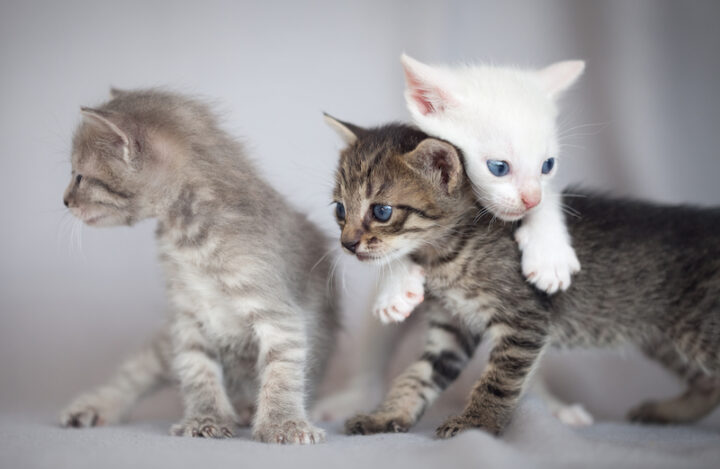
44 Gatti (44 Cats) is a fun song that alternates between a slow pace for the verses and a quick pace for the refrain. If you’re looking for a tune to give your mouth a workout, this is a great choice!
Nella cantina di un palazzone
Tutti i gattini senza padrone
Organizzarono una riunione
Per precisare la situazione
Quarantaquattro gatti
In fila per sei col resto di due
Si unirono compatti
In fila per sei col resto di due
Coi baffi allineati
In fila per sei col resto di due
Le code attorcigliate
In fila per sei col resto di due
Sei per sette quarantadue
Più due quarantaquattro
Loro chiedevano a tutti i bambini
Che sono amici di tutti i gattini
Un pasto al giorno e all’occasione
Poter dormire sulle poltrone
Quarantaquattro gatti
In fila per sei col resto di due
Si unirono compatti
In fila per sei col resto di due
Coi baffi allineati
In fila per sei col resto di due
Le code attorcigliate
In fila per sei col resto di due
Sei per sette quarantadue
Più due quarantaquattro
Naturalmente tutti i bambini
Tutte le code potevan tirare
Ogni momento e a loro piacere
Con tutti quanti giocherellare
Quarantaquattro gatti
In fila per sei col resto di due
Si unirono compatti
In fila per sei col resto di due
Coi baffi allineati
In fila per sei col resto di due
Le code attorcigliate
In fila per sei col resto di due
Sei per sette quarantadue
Più due quarantaquattro
Quando alla fine della riunione
Fu definita la situazione
Andò in giardino tutto il plotone
Di quei gattini senza padrone
Quarantaquattro gatti
In fila per sei col resto di due
Marciarono compatti
In fila per sei col resto di due
Coi baffi allineati
In fila per sei col resto di due
Le code dritte dritte
In fila per sei col resto di due
In the cellar of a big building
All the kittens without a master
Organised a meeting
To clarify the situation
Forty-four cats
In rows of six with two left over
They joined together compactly
In rows of six with two left over
With whiskers aligned
In rows of six with two left over
The twisted tails
In rows of six with two left over
Six times seven is forty-two
Plus two is forty-four
They asked all the children
who are friends with all the kittens
For one meal a day and on occasion
To be able to sleep in the armchairs
Forty-four cats
In rows of six with two left over
They joined together compactly
In rows of six with two left over
With whiskers aligned
In rows of six with two left over
The twisted tails
In rows of six with two left over
Six times seven is forty-two
Plus two is forty-four
Of course all the children
Were able to pull all their tails
Every moment spent at their will
With all of them playing
Forty-four cats
In rows of six with two left over
They joined together compactly
In rows of six with two left over
With whiskers aligned
In rows of six with two left over
The twisted tails
In rows of six with two left over
Six times seven is forty-two
Plus two is forty-four
When at the end of the meeting
The situation was settled
The whole platoon went into the garden
Of those ownerless kittens
Forty-four cats
In rows of six with two left over
They marched together compactly
In rows of six with two left over
With whiskers aligned
In rows of six with two left over
The straight straight tails
In rows of six with two left over
10. Stella Stellina
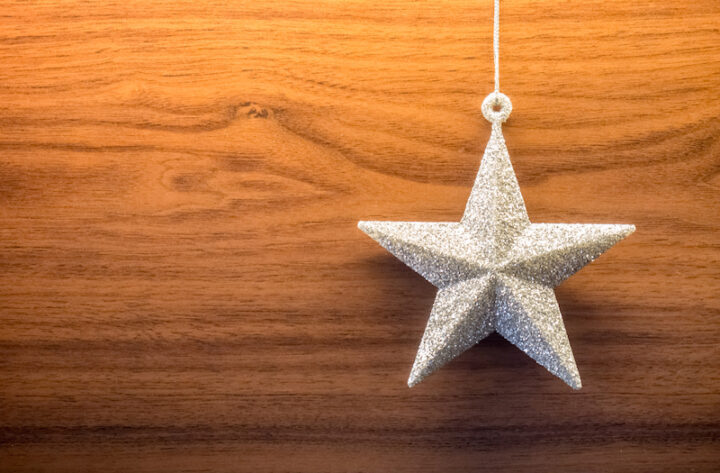
Our final song is a classic Italian lullaby called Stella Stellina (Star Little Star). It is a lot shorter and less complicated than some of the other songs here, so you should be able to learn it with your kids very quickly.
Stella stellina
La notte s’avvicina
La fiamma traballa
La mucca è nella stalla
La mucca e il vitello
La pecora e l’agnello
La chioccia e il pulcino
Ognuno ha il suo bambino
Ognuno ha la sua mamma
E tutti fan la nanna
Star little star
The night is approaching
The flame wobbles
The cow is in the stable
The cow and the calf
The sheep and the lamb
The hen and the chick
Everyone has a baby
Everyone has a mom
And everyone is sleeping
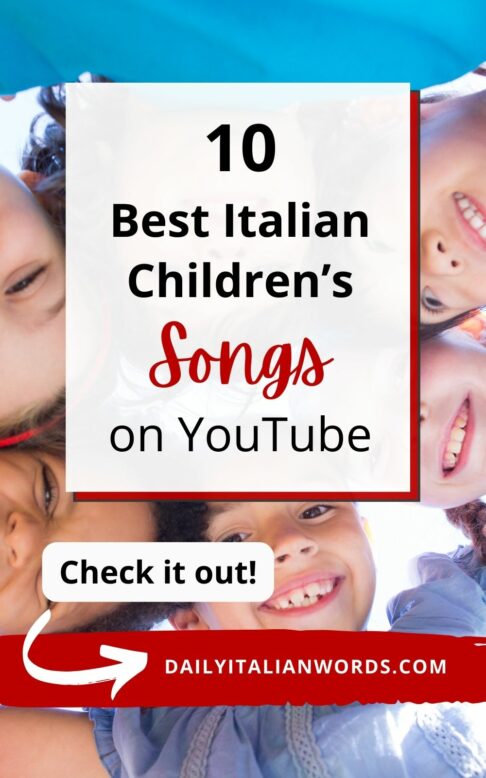
Heather Broster is a graduate with honours in linguistics from the University of Western Ontario. She is an aspiring polyglot, proficient in English and Italian, as well as Japanese, Welsh, and French to varying degrees of fluency. Originally from Toronto, Heather has resided in various countries, notably Italy for a period of six years. Her primary focus lies in the fields of language acquisition, education, and bilingual instruction.


